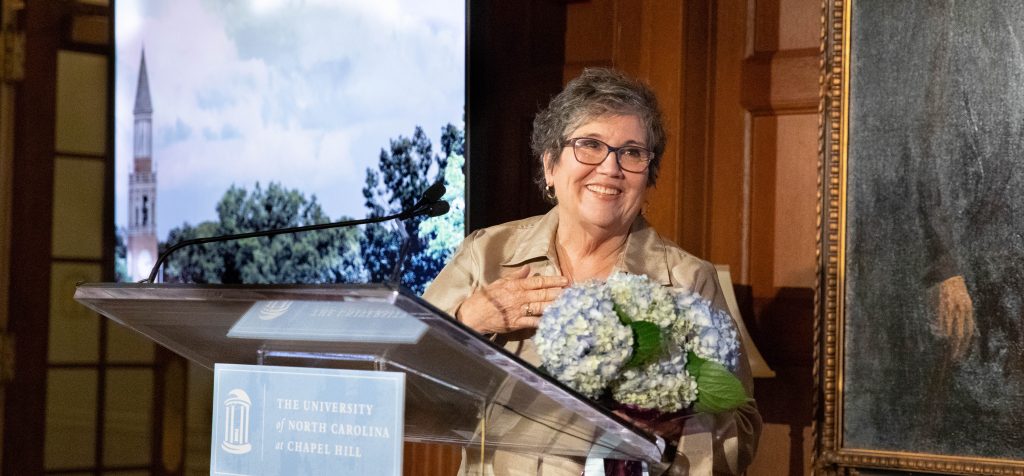At an event celebrating the Center’s 20th anniversary in October 2019, longtime CCPS supporter Marjorie Buckley announced a generous endowment creating five new Community Service Scholarships in addition to a four-day Outward Bound experience for up to 12 Community Service Scholars and a summer fellowship combining an Outward Bound expedition with a paid summer internship—all in honor of and named after CCPS director Lynn White Blanchard.
Blanchard, the Center’s director since 2002, has devoted her career to championing the role of higher education in addressing society’s pressing issues and improving community through engaged teaching, research and service. She has elevated Carolina into one of the nation’s top universities for engaged scholarship and public service. Among numerous other initiatives for CCPS, Blanchard helped establish the Center’s signature program Thorp Faculty Engaged Scholars, a learning community that supports engaged scholarship among Carolina faculty, and the Buckley Public Service Scholars program, which provides a framework for undergraduates engaging in service. In April 2019, Blanchard received the prestigious C. Knox Massey Distinguished Service Award for “unusual, meritorious or superior contributions” to the University.
Holding a master of public health and a Ph.D. in public health from UNC-Chapel Hill, Blanchard is a clinical associate professor in the Gillings School of Global Public Health and an instructor for the service-learning course Philanthropy as a Tool for Social Change. She is also a founding member of the Academy of Community Engagement Scholarship.
Read on to learn more about what draws this inspiring leader to service and what messages she wants to continue amplifying around service in higher education.

Q: How has your understanding of service evolved over time?
A: To really make an impact, you need to think about how you address issues on multiple levels. Yes, you need the direct service of delivering meals, or having a soup kitchen—but ultimately, you have to think about the root causes: Why are people hungry? What can you do to end hunger? We use a simplified version of that in the Buckley Public Service Scholars (BPSS) program called ‘dimensions of service,’ which is based on understanding that these are complex problems, and no one way of addressing them is going to change things.
Q: What have been some of the biggest challenges so far in your work?
A: A challenge for the Center has always been that not everybody has this broader view of service. People assume we’re synonymous with volunteerism and that we’re strictly student-oriented. While that’s certainly the lion’s share of much of what we do, it’s important to acknowledge the ways that the University, through CCPS, addresses issues. Another challenge is communicating that skills and attitudes gained through participating in public service are not just applicable in service, but also career paths.
Q: What has been your favorite part of directing CCPS?
A: Working with students. We have a lot to learn from the students, who approach things in a very different way and bring new ideas and passions. I think the new generation benefits from knowing some of the history and experience. But at the same time, you have to be open to new ways of addressing things as well. The work is also fundamentally relational—whether it’s students, faculty, community partners, donors… It’s the relational basis of it and the fact that you all share common goals in terms of what you want to accomplish and how you work together to achieve them.
Q: What are some of the things you’ve been most proud of achieving?
A: Thanks to the generosity of donors and people who care about the Center, we’ve been able to really institutionalize much of the work. Both the BPSS and Thorp Faculty Engaged Scholars programs have been designed, implemented and institutionalized over my time here. Now the same is true for the Community Service Scholarships program. In the early days of the Center, we were thinking about scholarships and thought we’d never have the money to do that. Now two primary donors who support the idea of endowed scholarships are enabling students who are dedicated to public service, but might not have the time due to work. These scholarships allow them the ability, in terms of time and support through programmatic activities, to develop their ideas.
Q: What advice do you have for students who want to get involved in their community?
A: I think it’s one reason why we have the BPSS program, which can be looked at as a way to explore different options. I encourage folks not to be so narrow in their thinking and be open to learning about what might be out there. Think of service in the way you think about your major. Our listserv would be a great example of where there are all sorts of things you could potentially experience. There are so many ways that you can be involved in a particular service you’re passionate about, so try some different things before you hone in. And also, don’t hesitate to talk to our staff!
Carolina senior Serah Lee ’20 contributed editing.
